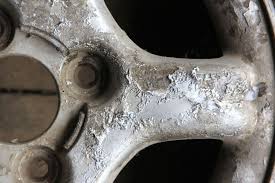Aluminum is one of the most widely used metals due to its lightweight, strength, and resistance to corrosion. But a common question arises: will aluminum rust? The short answer is no—aluminum doesn’t rust in the traditional sense like iron or steel. However, it can corrode under certain conditions. In this article, we’ll explore aluminum’s corrosion resistance, how different treatments (like vapor blasting or anodizing) affect it, and the best ways to protect or restore aluminum surfaces, including using Rust-Oleum paint for aluminum and specialized aluminum rust cleaners.
Why Aluminum Doesn’t Rust (But Can Corrode)
Rust is a specific type of corrosion that occurs in iron and steel when they react with oxygen and moisture, forming iron oxide. Aluminum, on the other hand, doesn’t contain iron, so it does not rust. Instead, aluminum undergoes a different process called oxidation. When exposed to air, aluminum forms a thin, protective layer of aluminum oxide, which prevents further degradation. This makes aluminum highly rust-proof in most environments.
However, if this oxide layer is damaged or exposed to harsh chemicals (like saltwater or industrial pollutants), aluminum can corrode. Pitted or white powdery deposits may appear, signaling oxidation. So while is aluminum rust proof? Technically yes—but it’s not entirely immune to corrosion.
Factors Affecting Aluminum Corrosion
1. Will Vapor Blasted Aluminum Rust?
Vapor blasting (wet blasting) cleans and smooths aluminum surfaces, removing contaminants and old oxidation. Since this process exposes fresh metal, the aluminum will quickly reform its oxide layer. Properly treated, vapor blasted aluminum remains corrosion-resistant, especially if sealed or painted afterward.
2. Will Anodized Aluminum Rust?
Anodizing enhances aluminum’s natural oxide layer through an electrochemical process, making it even more durable. Anodized aluminum is highly resistant to corrosion, scratches, and wear, making it ideal for outdoor and marine applications.
3. Will Cast Aluminum Rust?
Cast aluminum, used in automotive and industrial parts, is also corrosion-resistant. However, impurities in the alloy or poor finishing can lead to oxidation over time. Regular maintenance helps prevent issues.
How to Protect Aluminum from Corrosion
Using Rust-Oleum Paint for Aluminum
One of the best ways to shield aluminum from oxidation is by applying a protective coating. Rust-Oleum aluminum paint is specially formulated to adhere to non-ferrous metals, providing a durable barrier against moisture and chemicals. For optimal results, use a Rust-Oleum aluminum primer first to ensure proper adhesion and long-lasting protection.
Removing Existing Corrosion
If your aluminum has visible oxidation, you’ll need a rust remover for aluminum. Products like aluminum rust cleaner can dissolve light corrosion without damaging the metal. For heavy buildup, a paste of baking soda and water or a commercial aluminum cleaner can help remove rust from aluminum effectively.
Steps to Restore and Protect Aluminum
- Clean the Surface – Use a degreaser or aluminum rust cleaner to remove dirt and oxidation.
- Sand or Polish – Light sanding (for severe corrosion) or polishing can restore shine.
- Apply Primer – A Rust-Oleum aluminum primer ensures paint adhesion.
- Paint – Use Rust-Oleum paint aluminum for a protective, decorative finish.
- Seal (Optional) – A clear coat adds extra durability.
Does Aluminum Oxidize?
Yes, aluminum oxidizes—but unlike rust, this oxidation forms a protective barrier. However, in highly acidic or alkaline environments, this layer can break down. To oxidize aluminum intentionally (like for a weathered look), chemical treatments or exposure to certain elements can accelerate the process.
Aluminum is naturally rust-proof, but it can corrode if neglected. Whether you’re working with cast aluminum, anodized aluminum, or vapor blasted aluminum, proper maintenance is key. Using Rust-Oleum paint for aluminum, along with primers and cleaners, ensures long-term protection. If corrosion appears, a good rust remover aluminum treatment can restore the metal’s integrity. By understanding aluminum’s behavior, you can keep it looking and performing its best for years.





























